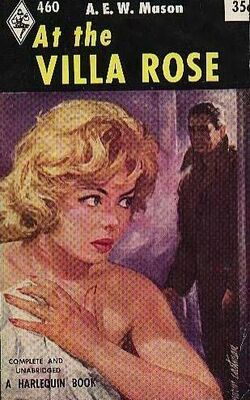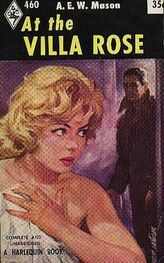She took up a length of the thin cord.
"Now, how are we to begin?" she said awkwardly. "I think I will ask you, mademoiselle, to put your hands behind you."
Celia turned her back and crossed her wrists. She stood in her satin frock, with her white arms and shoulders bare, her slender throat supporting her small head with its heavy curls, her big hat-a picture of young grace and beauty. She would have had an easy task that night had there been men instead of women to put her to the test. But the women were intent upon their own ends: Mme. Dauvray eager for her seance, Adele Tace and Helene Vauquier for the climax of their plot.
Celia clenched her hands to make the muscles of her wrists rigid to resist the pressure of the cord. Adele quietly unclasped them and placed them palm to palm. And at once Celia became uneasy. It was not merely the action, significant though it was of Adele’s alertness to thwart her, which troubled Celia. But she was extraordinarily receptive of impressions, extraordinarily quick to feel, from a touch, some dim sensation of the thought of the one who touched her. So now the touch of Adele’s swift, strong, nervous hands caused her a queer, vague shock of discomfort. It was no more than that at the moment, but it was quite definite as that.
"Keep your hands so, please, mademoiselle," said Adele; "your fingers loose."
And the next moment Celia winced and had to bite her lip to prevent a cry. The thin cord was wound twice about her wrists, drawn cruelly tight and then cunningly knotted. For one second Celia was thankful for her gloves; the next, more than ever she regretted that she wore them. It would have been difficult enough for her to free her hands now, even without them. And upon that a worse thing befell her.
"I beg mademoiselle’s pardon if I hurt her," said Adele.
And she tied the girl’s thumbs and little fingers. To slacken the knots she must have the use of her fingers, even though her gloves made them fumble. Now she had lost the use of them altogether. She began to feel that she was in master-hands. She was sure of it the next instant. For Adele stood up, and, passing a cord round the upper part of her arms, drew her elbows back. To bring any strength to help her in wriggling her hands free she must be able to raise her elbows. With them trussed in the small of her back she was robbed entirely of her strength. And all the time her strange uneasiness grew. She made a movement of revolt, and at once the cord was loosened.
"Mlle. Celie objects to my tests," said Adele, with a laugh, to Mme. Dauvray. "And I do not wonder."
Celia saw upon the old woman’s foolish and excited face a look of veritable consternation.
"Are you afraid, Celie?" she asked.
There was anger, there was menace in the voice, but above all these there was fear-fear that her illusions were to tumble about her. Celia heard that note and was quelled by it. This folly of belief, these seances, were the one touch of colour in Mme. Dauvray’s life. And it was just that instinctive need of colour which had made her so easy to delude. How strong the need is, how seductive the proposal to supply it, Celia knew well. She knew it from the experience of her life when the Great Fortinbras was at the climax of his fortunes. She had travelled much amongst monotonous, drab towns without character or amusements. She had kept her eyes open. She had seen that it was from the denizens of the dull streets in these towns that the quack religions won their recruits. Mme. Dauvray’s life had been a featureless sort of affair until these experiments had come to colour it. Madame Dauvray must at any rate preserve the memory of that colour.
"No," she said boldly; "I am not afraid," and after that she moved no more.
Her elbows were drawn firmly back and tightly bound. She was sure she could not free them. She glanced in despair at Helene Vauquier, and then some glimmer of hope sprang up. For Helene Vauquier gave her a look, a smile of reassurance. It was as if she said, "I will come to your help." Then, to make security still more sure, Adele turned the girl about as unceremoniously as if she had been a doll, and, passing a cord at the back of her arms, drew both ends round in front and knotted them at her waist.
"Now, Celie," said Adele, with a vibration in her voice which Celia had not remarked before.
Excitement was gaining upon her, as upon Mme. Dauvray. Her face was flushed and shiny, her manner peremptory and quick. Celia’s uneasiness grew into fear. She could have used the words which Hanaud spoke the next day in that very room-"There is something here which I do not understand." The touch of Adele Tact’s hands communicated something to her-something which filled her with a vague alarm. She could not have formulated it if she would; she dared not if she could. She had but to stand and submit.
"Now," said Adele.
She took the girl by the shoulders and set her in a clear space in the middle of the room, her back to the recess, her face to the mirror, where all could see her.
"Now, Celie"-she had dropped the "Mlle." and the ironic suavity of her manner-"try to free yourself."
For a moment the girl’s shoulders worked, her hands fluttered. But they remained helplessly bound.
"Ah, you will be content, Adele, to-night," cried Mme. Dauvray eagerly.
But even in the midst of her eagerness-so thoroughly had she been prepared-there lingered a flavour of doubt, of suspicion. In Celia’s mind there was still the one desperate resolve.
"I must succeed to-night," she said to herself-"I must!"
Adele Rossignol kneeled on the floor behind her. She gathered in carefully the girl’s frock. Then she picked up the long train, wound it tightly round her limbs, pinioning and swathing them in the folds of satin, and secured the folds with a cord about the knees.
She stood up again.
"Can you walk, Celie?" she asked. "Try!"
With Helene Vauquier to support her if she fell, Celia took a tiny shuffling step forward, feeling supremely ridiculous. No one, however, of her audience was inclined to laugh. To Mme. Dauvray the whole business was as serious as the most solemn ceremonial. Adele was intent upon making her knots secure. Helene Vauquier was the well-bred servant who knew her place. It was not for her to laugh at her young mistress, in however ludicrous a situation she might be.
"Now," said Adele, "we will tie mademoiselle’s ankles, and then we shall be ready for Mme. de Montespan."
The raillery in her voice had a note of savagery in it now. Celia’s vague terror grew. She had a feeling that a beast was waking in the woman, and with it came a growing premonition of failure. Vainly she cried to herself, "I must not fail to-night." But she felt instinctively that there was a stronger personality than her own in that room, taming her, condemning her to failure, influencing the others.
She was placed in a chair. Adele passed a cord round her ankles, and the mere touch of it quickened Celia to a spasm of revolt. Her last little remnant of liberty was being taken from her. She raised herself, or rather would have raised herself. But Helene with gentle hands held her in the chair, and whispered under her breath:
"Have no fear! Madame is watching."
Adele looked fiercely up into the girl’s face.
"Keep still, hein, la petite!" she cried. And the epithet-"little one"-was a light to Celia. Till now, upon these occasions, with her black ceremonial dress, her air of aloofness, her vague eyes, and the dignity of her carriage, she had already produced some part of their effect before the seance had begun. She had been wont to sail into the room, distant, mystical. She had her audience already expectant of mysteries, prepared for marvels. Her work was already half done. But now of all that help she was deprived. She was no longer a person aloof, a prophetess, a seer of visions; she was simply a smartly-dressed girl of today, trussed up in a ridiculous and painful position-that was all. The dignity was gone. And the more she realised that, the more she was hindered from influencing her audience, the less able she was to concentrate her mind upon them, to will them to favour her. Mme. Dauvray’s suspicions, she was sure, were still awake. She could not quell them. There was a stronger personality than hers at work in the room. The cord bit through her thin stockings into her ankles. She dared not complain. It was savagely tied. She made no remonstrance. And then Helene Vauquier raised her up from the chair and lifted her easily off the ground. For a moment she held her so. If Celia had felt ridiculous before, she knew that she was ten times more so now. She could see herself as she hung in Helene Vauquier’s arms, with her delicate frock ludicrously swathed and swaddled about her legs. But, again, of those who watched her no one smiled.
Читать дальше






